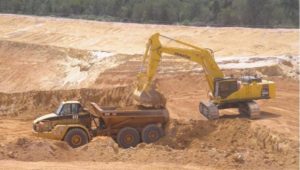Iluka to Build
Industrial-Scale Mineral
Separation Plant
The Puttalam mineral sands deposit, if developed, has the potential to deliver considerable economic and social benefits to Sri Lanka by way of mineral royalties, employment, terms of trade, and skills and technical development, Iluka’s Head of Resource Development, Simon Hay said.
Australia’s Iluka currently holds several mineral exploration licenses in the Puttalam district and earlier the company estimated that its Puttalam mineral sands deposit has 56 million tonnes of titanium-bearing heavy minerals, enough to support a mining operation with a life in excess of 20 years.
“Sri Lanka is a democratic, developing economy with an educated workforce and a desire for responsible foreign investment. Iluka has over 60 years’ industry experience and a track record of sustainable development. So, in many respects, this project offers the prospect of a natural partnership between the company, government and local community,” Hay said following a recent exploration visit of Sri Lankan officials to Australia’s Iluka operations.
“Iluka is committed to open and transparent engagement with the Sri Lankan Government and people. Last week’s delegation visit to Australia was the second this year and forms part of a broader program that will demonstrate the company’s credentials,” Hay said.
A delegation of seven senior government officials, including the Director General of the Geological Survey and Mines Bureau (GSMB) and the Deputy General Manager of Lanka Mineral Sands visited Iluka operations in Australia.
The visit was organized by Iluka Lanka Resources (Private) Limited, supported by the Australian Government via Austrade. Members of the delegation obtained a practical understanding of Iluka’s operational, financial and environmental credentials.
This included tours of the world’s largest mineral separation facility for zircon at Geraldton in Western Australia; and the world’s largest zircon mine, Jacinth-Ambrosia, in remote South Australia.
Related:“Sunday Observer”









No Comments